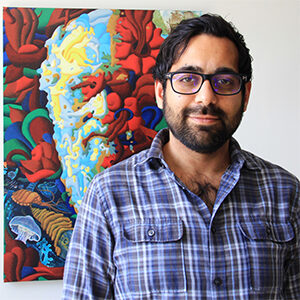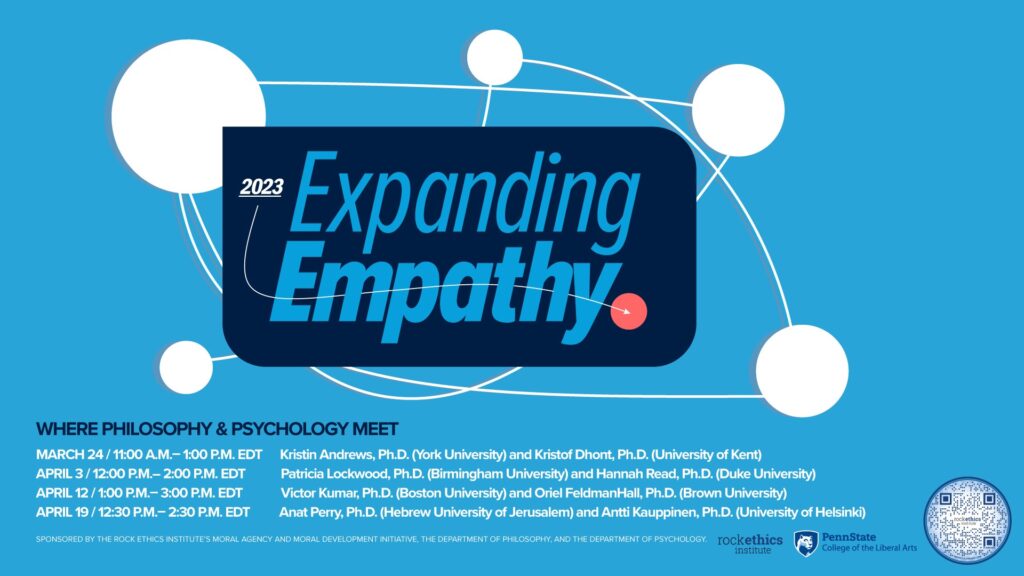Expanding Empathy Speaker Series: Moral Learning

Victor Kumar, Ph.D., is an assistant professor of philosophy at Boston University where he is director of the interdisciplinary Mind and Morality Lab. He works primarily on moral cognition, human evolution, and social progress. His book with Richmond Campbell, A Better Ape, was published by Oxford University Press in 2022. His articles have been published in such journals as Ethics, Nous, Philosophers’ Imprint, and Cognition.
LECTURE TITLE: “What We Can Learn from the Historic Decline of Anti-Gay Attitudes“
ABSTRACT: Since the 1960s, the United States and other countries have undergone an extraordinary decline in anti-gay attitudes. Understanding how this happened is not just of social scientific interest. It is of enormous public moral interest too. By grasping the psychological and cultural mechanisms underpinning social change, policy makers and other leaders can foster greater acceptance of gay people—along with other LGBTQ+ people who continue to experience intense stigma and marginalization. This is especially important given the reactionary backlash against LGBTQ+ people, including legislation targeting bathrooms, youth sport, and primary education. I lay out several mechanisms and zoom in on a particularly important one. The key to moral progress, in the past and perhaps in the future, is positive feedback loops between attitudes and social structure.

Oriel FeldmanHall, Ph.D., is the Alfred Manning Associate Professor of Cognitive, Linguistic, and Psychological Sciences at Brown University. She received the Benefactor Scholarship for her doctorate at the University of Cambridge, United Kingdom, and her bachelor of arts from Cornell University. FeldmanHall studies how we learn who to trust, how to cooperate, when to reciprocate, and what to do when we have been treated unfairly. Her research seeks to disentangle the cognitive and neural processes behind the complex choices that form the basis of human social behavior. She has won numerous awards, including the Association for Psychological Science (APS) Rising Star Award, the NARSAD Young Investigator Award, the Henry Merritt Wriston Award for excellence in teaching and scholarship, the Society for Neuroeconomics (SNE) Early Career Award, the Cognitive Neuroscience Society (CNS) Young Investigator Award for outstanding contributions to science, the APS Janet Taylor Spence Award for Transformative Early Career Contributions, and the American Psychological Association (APA) Distinguished Scientific Award for Early Career Contribution to Psychology in the area of cognition and human learning.
LECTURE TITLE: “How Emotion Influences Social Learning”
ABSTRACT: Learning whom to trust and cooperate with is a major challenge of daily life. Models explaining how this is achieved describes the critical role of reward prediction errors. Social value, such as trustworthiness, is learned by computing any deviations from expected outcomes, known as the prediction error. Prior work has focused on these reward prediction errors, largely ignoring violations of expected emotional experiences—emotion prediction errors. And yet, decades of work done in a separate domain has revealed the powerful force emotions have during learning. By measuring real-time fluctuations in emotion as people decide to punish or forgive others, we reveal that emotion prediction errors exert the strongest impact during decision-making. We additionally find that a choice to punish or forgive can be decoded in less than a second from an evolving emotional response, suggesting that emotions swiftly influence choice. Finally, individuals reporting significant levels of depression exhibit selective impairments in using emotion—but not reward—prediction errors. Evidence for emotion prediction errors potently guiding social behaviors challenge standard decision-making models that have focused solely on reward.
